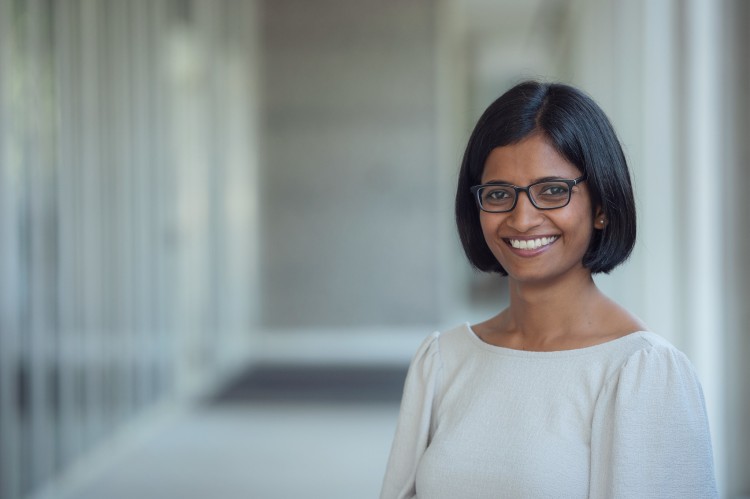
Meet UBC Sauder’s new faculty – Swapnika Rachapalli

Related Links
At UBC Sauder, faculty members are more than just ‘professors.’ They conduct impactful research that is changing how society views the world while also inspiring students to pursue their academic passions and become the thoughtful, values-driven leaders the business world needs. This year, UBC Sauder welcomes eight new lecturers and tenure-track faculty to the school. In the sixth of this series, we introduce you to Swapnika Rachapalli, Assistant Professor in the Strategy and Business Economics Division.
Where are you from, and what brought you to UBC Sauder?
I am from India – born and brought up in Bangalore (sometimes referred to as the Silicon Valley of India). I moved to Toronto for my PhD in Economics, and wanted to continue pursuing a career in academic research. UBC is well renowned for academic excellence, and Vancouver is a great city to settle in and make home. The faculty in the Strategy and Business Economics Division at UBC Sauder are an especially a good fit for my research interests. I was lucky enough to be offered a job here and have been very happy since I joined.
What are your areas of research?
My research interests are at the intersection of International trade, Growth, and Development. I use detailed data on firms in developing countries like India to understand how economic activity changes in response to trade openness, which in turn has implications for the macroeconomic outcomes of the country, like growth and welfare. Specifically, I study how global trade networks give firms opportunities to learn about new information, ideas, and technologies that they were previously unaware of. In a way, I ask a broad question – can countries trade ideas when they trade goods with each other?
What fuels your research – what prompted you to research this area?
I have always been curious about the answer to the classic economics question: what makes some countries rich and some countries poor? Growing up in India during its transition from a poor country to a fast-growing, emerging economy showed me that countries can change, grow, and develop over time. This question motivated me to pursue a PhD in economics, with the purpose of studying development economics. During my first year in the PhD program however, I sat in on a “Topics in international trade” course, which taught us the different ways through which countries can benefit from trading with each other: increased access to goods, jobs, markets, and ideas, all of which improves living standards. I realized that most of India’s growth in the last few decades has been a result of the country finally liberalizing and opening up its borders to trade in mid 1990s. This naturally merged with my existing interests in development economics, and I set out to examine how important participation in the global markets is for low income economies to grow.
What inspires you to teach?
The best thing about doing research is that you never stop learning, and I always look forward to those moments when I learn a new idea and realize its implications. I remember all the times that I finally understood some eluding concept and how it enabled me to understand the world around me. I have realized over time that it is extremely rewarding to help other people achieve these moments where they understand an economics concept and learn to use it in their day-to-day lives. I believe a strong foundation in basic economics is useful not only for business students, but for anyone to understand how people, markets, and the world functions.
What’s the most interesting thing you’ve discovered through your research?
In my research, I explore firm-level data to understand how firms adapt to changing economic conditions. One of the most fascinating things I have discovered about Indian manufacturing firms is how flexible they are in the set of products that they manufacture. Every year, more than 60 per cent of Indian firms change the set of products they make – either by dropping some products or by adding new products. This product switching behavior could be happening for a large number of reasons – adapting to new market competition, demand conditions, or learning new technologies and making new innovations. One of my research agendas is to explore this nature of firm product choice and understand why, when, and how firms are able to be this flexible with the products they make.
What do you believe is the future of your industry?
The last few years have been fascinating for trade economists: the rise in protectionism, the global pandemic highlighting how intricately connected and dependent countries are, and the realization that while supply chain linkages around the world are crucial for the global economy, there is scope for countries to diversify their trade relationships in the face of potential future disruptions. While I cannot predict what the future of global trade policy may be, there is perhaps a demand for a change in existing interdependencies around the world. Figuring out appropriate trade policies, and the resulting implications for different countries’ outcomes, will likely keep trade economists pretty occupied over the next few years.
Can you tell us an interesting fact about yourself?
I was trained in vocal south Indian classical music (Carnatic music) as a kid, which unfortunately I haven’t kept up with. I am now learning how to play the violin, which is so much harder to pick up as an adult.
What are you most looking forward to in Vancouver?
I am looking forward to the outdoor activities Vancouver has to offer. I have been going on hikes with my dog around Vancouver when time permits. This winter I am planning to learn how to ski (and hopefully survive!). In the summer I would like to go out into the water more – specifically to try paddle boarding.